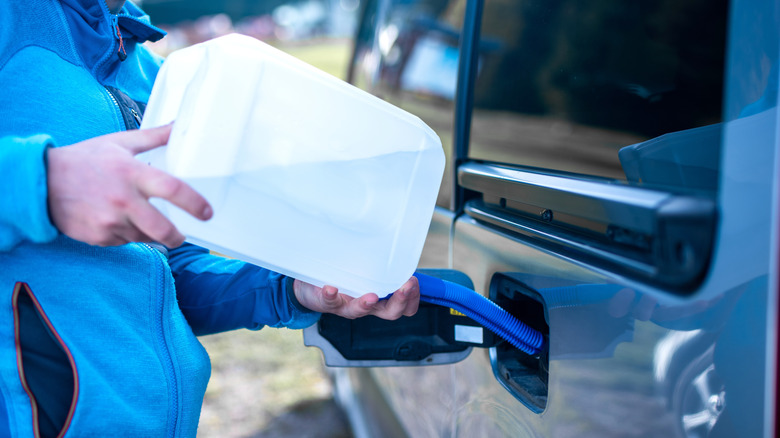
We may receive a commission on purchases made from links.
The government's strict emissions limits for combustion-powered vehicles have pushed automakers to develop technologies that let their engines stay compliant while producing gobs of power. Diesel exhaust fluid (DEF) is one important component, designed to reduce diesel engines' nitrogen oxide emissions. Sometimes known as AdBlue, DEF is a solution of deionized water and urea, stored in a separate tank from the fuel and automatically sprayed after combustion into the engine's exhaust stream.
There, DEF turns into ammonia and isocyanic acid, which react chemically with exhaust gases like nitrous oxide and break them down into harmless substances such as nitrogen, water vapor, and carbon dioxide. The capacity of your DEF tank varies based on your vehicle but typically ranges from five to 25 gallons. The tank must be refilled from time to time, as vehicles use a gallon of DEF for every 50 gallons of diesel fuel burned.
While you can find DEF at some gas stations, it's often sold in containers at truck stops, which aren't found everywhere. So drivers often buy an extra jug and store it for when they may need it and find it out of reach. Unopened DEF typically lasts about two years from when it was made before it goes bad. But once you've opened it and have an excess, it's expected to last about a year sitting in the bottle before it breaks down, provided it's stored properly: sealed and in a cool, dry place away from sunlight (ideally between 12 and 86 degrees).
 Simona Jurasova/Shutterstock
Simona Jurasova/Shutterstock
While DEF is created for long shelf life, letting it sit for many months before using it may not be the best choice, as improper sealing or significant headspace in the jug can cause it to evaporate and crystallize. But you can tell if your DEF has gone bad just by looking at it, since contaminated DEF looks cloudy, discolored, or crystallized instead of clear, or be thick rather than easy-flowing.
This is your cue to dispose of the old DEF. And being so reasonably priced — you can get 2.5 gallons of BlueDEF for about $21 — it won't hurt to always use a fresh one rather than settle for old fluid, which might be less effective and even damage your selective catalytic reduction system. The good thing is that your vehicle will show a warning light to remind you to refill the DEF tank well before it runs out. This reduces the likelihood of being caught off guard and eliminates the need to carry an opened bottle of DEF around.
However, if you're saving already-opened DEF for future use, make sure the cap is securely tightened to prevent it from mixing with air or other pollutants like dust. And avoid storing it near the engine or exhaust to prevent degradation from heat exposure. Then again, all this assumes you're keeping your emissions systems intact, and aren't considering deleting your diesel truck.














